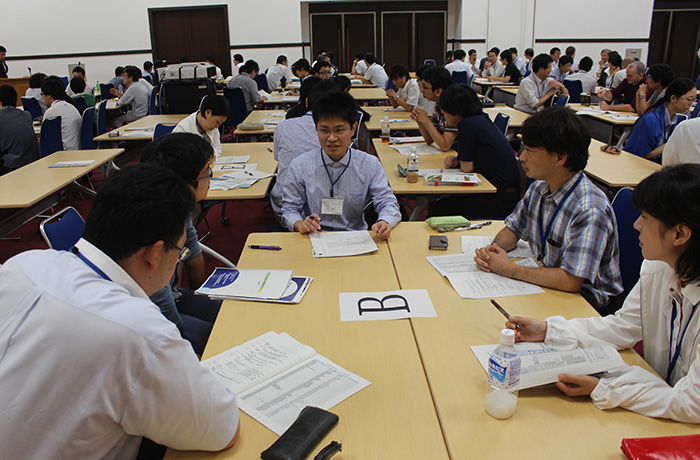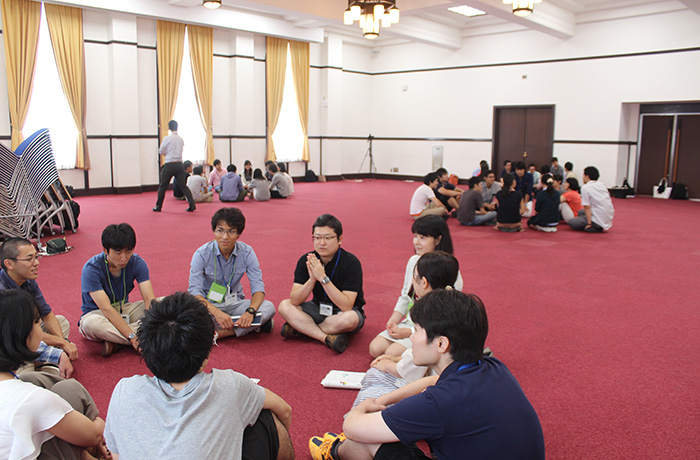Here you will get to know the FD (Faculty Development) initiatives currently underway at Kyoto University. In a narrow sense, FD is “a generic term for organizational efforts to improve course content and teaching methods” referring to activities related to teaching by faculty members (the micro level), but is now coming to be understood more broadly to include enhancement of curricula and educational programs (middle level), and initiatives to enhance/improve organizations as a whole, such as educational system reforms (macro level).
At Kyoto University, FD is carried out across all three of these levels. The Faculty Development Committee, established to advance FD across the whole university, has an annual program of activities including the Kyoto University Education Symposium (for all faculty members of the university), Seminar for New Faculty (for newly-appointed faculty members), and Preparing Future Faculty Program (for graduate students). The Committee also offers FD support tailored to the needs of the university’s various faculties and graduate schools, including provision of instructors for their FD programs.
Organization for University-Wide Advancement of FD
The Faculty Development Committee, Kyoto University is an organization designed to discuss, implement, and support the advancement of FD across the entire university. Established in February, 2007, the Committee is composed of the university’s Executive Vice-President for Education, Assistants to the Executive Vice-President for Education, faculty members selected from each division, faculty members of the Center for the Promotion of Excellence in Higher Education, and representatives of the Administration Office. Its actual activities are as follows.
- Collaboration and planning of FD activities
Implementing new activities (such as the Kyoto University Education Symposium); conducting workshops on educational challenges shared across the university and specific to each of its faculties and graduate schools - Joint implementation of university-wide FD
Pursuing initiatives common across all faculties and graduate schools (Seminar for New Faculty, Program for Graduate Students and Postdoctoral Fellows, etc.) - Support for FD activities in faculties and graduate schools
Providing support for FD activities implemented at faculty and graduate school level (Graduate School of Letters PFF Project, seminars in the Graduate School of Education, etc.) - FD-related information gathering, dissemination, and feedback
Ascertaining the educational challenges faced by each faculty and graduate school; disseminating information on FD activities (through the Center’s website, publication of Mutual Faculty Development, etc.)
The Center for the Promotion of Excellence in Higher Education coordinates these initiatives and implements them in cooperation with the Faculty Development Committee. The Committee’s activities are introduced in the annual publication Mutual Faculty Development, which is also made available in PDF on the website.
Forum for Sharing Issues Related to University-Wide FD
Every year Kyoto University has held University-wide Education Symposium since 1996. This is a forum for sharing practices and challenges within the university on a variety of education-related topics ranging from liberal arts and sciences courses to university evaluation. The Symposium is a whole-day event held in early September each year. Themes dealt with at the Symposium to date include:
- “Data- and ideal-based education reform at Kyoto University: From entrance examination through postgraduate education” (the 2016 academic year; 229 participants)
- “Kyoto University Way: How to Foster Talents Who Will Shape the Future” (the 2015 academic year; 251 participants)
- “Learner Autonomy in University Education” (the 2014 academic year; 230 participants)
The content of the symposium, including presentation materials used on the day, are published in the Kyoto University Education Symposium Report, which can be downloaded from the Faculty Development Committee website. This publication offers insight into a variety of matters including directions and strategies (both in-progress and planned) for education reform at Kyoto University, and the types of initiatives being pursued in other faculties and graduate schools. An informal discussion session is held after the symposium, allowing exchange of information with many faculty and administrative staff members from other faculties and graduate schools.

FD for Newly-Appointed Faculty Members
Since 2010, an annual Seminar for New Faculty has been held for all those newly appointed to faculty positions at Kyoto University. The Seminar is an opportunity for new appointees to think about what Kyoto University-style education should be, and to find out what kinds of education-related support is available at the university, as well as what kinds of educational challenges are faced by the university, its faculties and graduate schools, and individual faculty members, and how they are tackling them.
The Seminar is held each year over a whole afternoon in early September, in anticipation that it will function as an opportunity for reflection on educational experiences in the first semester. It is usually attended by over 100 faculty members. The program covers a wide range of topics in a variety of formats, including an opening lecture on education reform at Kyoto University, introductions to teaching practice by individual faculty members of the university (“My Classes”), participative group discussions on specific themes (last year’s themes are shown below), and an integration session involving reflection by all Seminar participants.
Thematic group discussions (themes from the 2016 academic year Seminar)
- What to do if asked to teach a course in English
- How to run a research lab
- How to engage with students facing difficulties
- Active learning-based classes in lecture courses
- Education utilizing ICT—focus on flipped classrooms
The content of the Seminar’s general sessions including opening lecture, mini-lectures, and My Class presentations can be viewed on the Center’s page on the Kyoto University OCW website.
FD for Graduate Students
Recently, teaching ability has come to hold considerable weight alongside research ability in the appointment of new faculty members. Almost all research-intensive universities now offer their own FD programs for graduate students, under the title of PFF (Preparing Future Faculty) or Pre-FD. Kyoto University conducts such activities to aid the professional development of its graduate students, ODs (“over-doctors”; job-seeking doctoral degree holders), and postdocs who intend to be faculty members. The Center implements and supports the following PFF activities. Further details can be found under “Preparing Future Faculty Program of Kyoto University.” Those completing the various activities are given completion certificates and can include them on their resumes.
For graduate students in all Graduate Schools:
1.Program for Graduate Students and Postdoctoral Fellows: A foundational program held in a workshop format over a whole day in late August each year.
2. Inter-Graduate School Educational Program “Teaching at University”: Held on an intensive basis over three days in early February each year for students from all Graduate Schools. This is a hands-on program that includes all stages from class design to implementation of mock classes.
For graduate students in the Graduate School of Letters:
3.Graduate School of Letters PFF Project: A hands-on program in which ODs and postdocs in the Graduate School of Letters design and implement a class (relay lecture) as instructors.
4.Faculty of Letters cross-credited relay lecture in collaboration with the Consortium of Universities in Kyoto: A developmental program mostly for those who have completed the Graduate School of Letters PFF Project, in which participants design and implement a course over the whole 15 weeks per semester.
Internal and External FD Networks
The Kyoto University Center for the Promotion of Excellence in Higher Education is working to build FD-related networks through various funded projects and joint-use educational centers. Current activities in this area are as follows
-
Kansai Faculty Development Association
Launched in April, 2008, this is an FD-related mutual aid organization involving universities and junior colleges in the Kansai region. The Association’s various activities are profiled on its website. -
MOST Fellows
The Center has been operating the MOST Fellowship Program to promote the enhancement of university teaching at national level since the 2012 academic year. Every year, ten university faculty members are selected from all over the country to participate in a year-round program in which they work on improving their own teaching while interacting with other participants face-to-face and online, and aim to develop a community of university teachers. Outcomes are made available to the public on MOST, and presented at the Kyoto University Conference on Higher Education.
As a MOST Fellow, you can:
- Connect with other faculty members passionate about teaching!
- Gain ideas and stimulus for teaching enhancement by working with your peers!
- Promote the outcomes of your activities at the Kyoto University Conference on Higher Education and on MOST!
- Interact with alumni of the Fellowship Program!
Specific activities, call for applications and other details can be viewed here.
Be a Fellow of the community bringing together under the keyword of “teaching” beyond institutional and disciplinary borders!



